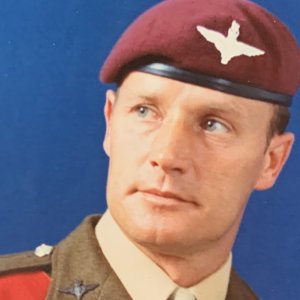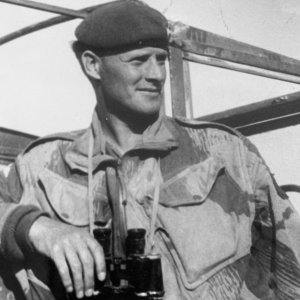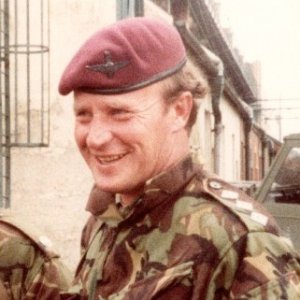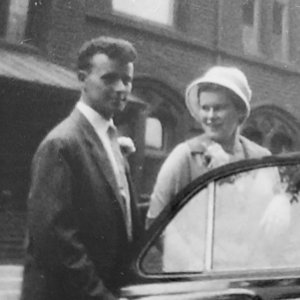- SURNAME
Menzies
- FORENAME
Norman Edward
- UNIT
2 or 3 Para
- RANK
Captain and Quartermaster
- NUMBER
502339
- AWARD
Member of the Order of the British Empire
- PLACE
Falklands 1982
- ADDITIONAL INFORMATION
born 02.09.1939
age 43 when received MBE
full obituary below
died 12.08.2023 Aged 83 due cancer
London Gazette 49134, 8th October 1982, Page 12857
In his Advice to the Officers of the British Army, the 18th-century satirist Francis Grose wrote that for a quartermaster, “The standing maxim of your office is to receive whatever is offered you, or you can get hold of, but not to part with anything you can keep. Your storeroom must resemble the lion’s den.”When Argentina invaded the Falklands in April 1982, Captain Norman Menzies, aged 42, was quartermaster (QM) of 3rd Battalion, Parachute Regiment. Immediately, 3 Para were ordered south under command of 3 Commando Brigade. As the officer responsible for the battalion’s logistics, Menzies knew the old joke: the QM’s is called “stores”, not “issues”, but before they had even sailed every man in 3 Para knew that Menzies’ maxim was precisely the opposite. Indeed, his propensity to receive (by fair means or foul) and issue, sometimes even before the need was recognised, would be a powerful contribution to 3 Para’s morale in their 60-mile march across East Falkland and the culminating, bloody, assault on Mount Longdon.In Menzies’ recommendation for an award, written just days after the Argentinian surrender, 3 Para’s commanding officer, Lieutenant-Colonel (later Lieutenant-General Sir) Hew Pike, wrote, “it is well known that the brigade’s support has been fraught with innumerable difficulties and hazards, caused by terrain, climate and enemy action”.Pike, an understated Wykehamist who would himself receive the DSO for his leadership and tactical acumen, had put it delicately. The problem was not only the ground, the weather and the enemy: the controversial decision to divide the force’s diminished logistic resources by opening up a second, southern, approach route to Port Stanley left 3 Commando Brigade gravely short of rations and ammunition.At San Carlos on May 21, Menzies had stood astride two landing craft whose coxswains were over-eager to leave the jetty, forcing them to keep fast until every last bit of 3 Para kit was offloaded. His professional skill, wrote Pike, was pivotal: “Without his organising ability and sheer determination the operation would certainly have ground to a halt. As it was, the rapid advance across the island was matched by superb and highly flexible support . . . his devotion in meeting the relentless needs of the battalion has been unstinting, and supremely successful . . . Never can a quartermaster have served his battalion better on operations.”Or perhaps in such critical circumstances. In the battle to take Mount Longdon, one of the peaks barring the way to Port Stanley, and its immediate aftermath, 3 Para would lose 23 men killed and 47 wounded, almost a third of their bayonet strength. The battalion’s success owed much to what the embedded journalist Robert Fox called Menzies’ “rat-like cunning necessary to be a QM”.Though knowing that medals would be rationed, the brigade and the landing force commanders — Royal Marines both — wrote on Menzies’ recommendation for an award “very strongly supported”. It was no surprise: “Norman the Storeman”, as Fox dubbed him ironically, if perilously, was greatly admired by the other QMs in the brigade. He was, noted Pike, “two paces ahead of everyone, probably on account of his upbringing”.Norman Edward Menzies was born in West Ham, east London, the day before war was declared in 1939, the third of four sons, and three sisters, one of whom had died in infancy. His father had been born in India, the son of a soldier in the Royal Artillery, and worked in the Woolwich Arsenal. In 1941 Menzies and his parents were evacuated to Little Bardfield in rural Essex, his siblings having been evacuated to south Wales at the outset. They returned to West Ham in 1944, only to face the German V1 and then V2 rockets.After the war, the growing family continued to struggle. One day a frozen side of beef was thrown over the wall into the yard of their terraced house, its provenance still today uncertain, but the proximity of the docks probably a clue. A day or so later the police arrived, and the still-frozen meat was taken away. His mother simply shrugged and said, “At least now we can have the fire on.” It was not the happiest of homes, and although Menzies passed the entrance tests for grammar school, they could not afford the uniform. Instead he went to the local secondary modern and left just short of his 15th birthday to work with a builder. In 1958, with National Service beckoning, he volunteered for the Parachute Regiment but was told he would have to sign up for three years instead of the call-up’s two. He would stay for 34.His quality was quickly recognised at the airborne forces depot at Aldershot. He was promoted to lance corporal , retained as an instructor, and the following year, 1959, was promoted to corporal. In Aldershot he met 19-year-old Lance Corporal Pat Milner of Queen Alexandra’s Royal Army Nursing Corps, in the Naafi club of the military hospital. Having ignored her friends’ warnings not to go out with Paras, they married in 1960.Pat survives him, along with a daughter, Dawn, who worked for Rushmoor borough council for 40 years; and a son, Kevin, who served in the Royal Military Police for 23 years and is now a social worker in mental health, supporting veterans.Menzies’ progress up the ranks continued apace, with the briefest loss of a “stripe” for some minor misdemeanour (par for the course in a tough regiment), but restored the same month after coming first in the battalion patrol competition. By 23 he was a sergeant with 1 Para in the Middle East. Just short of 6ft and the image of a clean-cut airborne soldier, he also became something of a military model, appearing in newspaper advertisements and playing a starring role in the Paras’ recruiting film.At 33, after three operational tours in Northern Ireland, he was appointed RSM of the Parachute Logistic Regiment, then of the depot, and commissioned four years later. He served as a company second-in-command in 1 Para and then QM of 2nd Battalion, Ulster Defence Regiment, in Armagh, before in 1980 becoming QM of 3 Para.After the Falklands came a stint as QM of 4 Para, the Territorial Army battalion in Yorkshire, followed by an operational staff job in Hong Kong. Then in 1988, the boy from the crowded East End terraced house who had left school at 14 was promoted to lieutenant colonel to be staff quartermaster at Sandhurst.He left the army in 1992 and went on to hold directorships with Securitas, and Pinkerton, and was latterly director of operations with Wilson James, overseeing the security arrangements for the athletes’ village at the London Olympics in 2012. In retirement he played even more golf, with a 3 handicap.The Falklands conflict was a near-run thing. The double imposition of the second axis of advance and the losses of critical equipment at sea, especially when the Atlantic Conveyer was sunk by an Exocet missile, and with it the Chinook helicopters meant to ferry combat supplies, brought the campaign close to disaster. In his recommendation for an award, Lieutenant Colonel Pike concluded simply, “No problem ever defeats this superb officer.”Lieutenant Colonel (SQM) Norman Menzies MBE (Mil), Parachute Regiment, was born on September 2, 1939. He died of cancer on August 12, 2023, aged 83
Last edited by a moderator:







